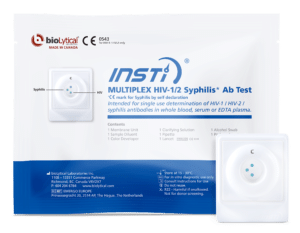RICHMOND, British Columbia, May 4, 2017 /PRNewswire/ —
bioLytical Laboratories, a world leader in rapid infectious disease tests, is pleased to announce that the INSTI HIV Self Test has received a certificate of validation from the Kenya Ministry of Health, Kenya Medical Laboratory Technologists and Technicians Board (KMLTTB), following a successful field study conducted in Western Kenya by investigators from the Kenya Medical Research Institute (KEMRI), Nairobi. This prospective study of self-testers was the first of its kind to demonstrate a high level of performance and usability for a fingerstick blood-based self-test such as INSTI. INSTI is the first HIV self-test of any kind to receive official approval in Kenya.
Kenya announced its HIV self-testing and PrEP campaigns, BeSelfSure and JipendeJiPrep, earlier today. It features bioLytical’s flagship product, INSTI HIV Self Test, as the only blood-based HIV self-test available in its pharmacies. Following the official campaign launch in Kenya, announced today by the National AIDS & STI Control Programme, bioLytical will continue to work with its partners to bring its INSTI HIV Self Test to the people of Kenya, with this KMLTTB certification in place as an indication of its high levels of quality and performance.
“We are grateful for the collaborative efforts from numerous stakeholders to help make this happen,” says Rick Galli, bioLytical’s Chief Technical Officer. “Kenya is leading the way in bringing HIV self-testing into sub-Saharan Africa through the private sector and we are excited to be a part of this ground-breaking initiative that will serve to demonstrate that a low cost, highly accessible HIV self-testing program can be effective and empowering for individuals to take control of their health.”
“With a network of over 7,000 regulated pharmacies throughout Kenya, this new initiative will allow access to HIV testing that is affordable to most Kenyans across the country through local pharmacies, which are a vital link in the healthcare network,” adds Robert Mackie, bioLytical’s President.
The Kenyan HIV self-testing program will not only involve the distribution of home HIV tests, but will also include a network of support and linkage to care resources for any individuals who test positive. As a first line screening tool, the INSTI HIV Self Test is intended to identify individuals who are likely to be HIV infected and instruct them to go to a clinic as soon as possible for confirmatory testing and counseling on prevention and treatment. For those who test negative, self-testing is an empowering opportunity for individuals to take control of their prevention methods and remain HIV negative.



